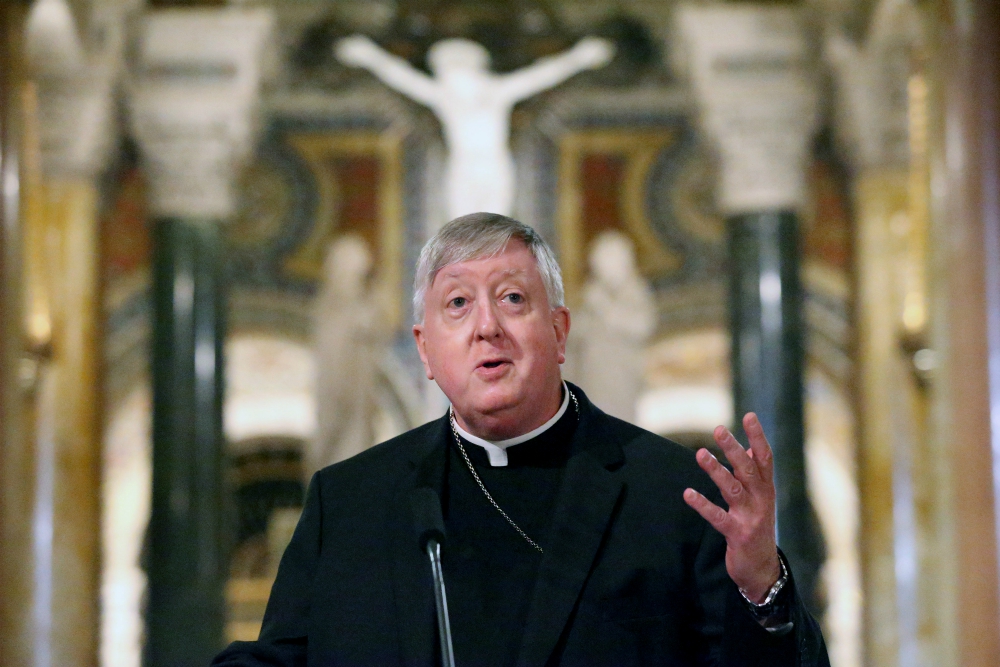
Bishop Mitchell Rozanski of Springfield, Massachusetts, makes his remarks at the Cathedral Basilica of St. Louis as he is introduced as the next archbishop of St. Louis on June 10. (Newscom/UPI/Bill Greenblatt)
For Mitch Rozanski, the archbishop-designate of St. Louis, "The Joy of the Gospel" is foundational to how a Christian should live in the 21st century. He refers to the 2013 exhortation of Pope Francis, Evangelii Gaudium, which laid much of the groundwork for this pontificate.
Known for his bright demeanor and open smile, Rozanski has worked to "Serve the Lord with Gladness" — his episcopal motto — most recently as bishop of Springfield, Massachusetts, since 2014. He was appointed to his new post on June 10 to succeed Archbishop Robert Carlson.
Belying his pastoral, unpretentious manner, Rozanski's move to St. Louis brings together two U.S. cities with rich histories for the Catholic Church. A Baltimore native, Rozanski served in the "premier see" (first diocese in the country) for 20 years as a parish priest before his appointment as an auxiliary bishop at age 46 in 2004, a role he served in for a decade. Now he becomes the 10th archbishop of "Rome of the West."
Both cities have hosted the pope on U.S. visits and have at various times been headed by cardinals or — more recently — had their archbishops go on to become cardinals. In Baltimore, that included one of Rozanski's mentors, Cardinal William Keeler, a legend in the field of Jewish-Catholic dialogue. In St. Louis, those have included Justin Rigali and Raymond Burke, both of whom wielded extensive influence in shaping the direction of the church, even well beyond the U.S., but whose legacies remain divisive.
Rozanski's own leadership to date has included a stint as chairman of the U.S. bishops' Committee on Ecumenical and Interreligious Affairs from 2014 to 2017, a role that overlapped with his move from auxiliary bishop to bishop of Springfield in western Massachusetts.
In Springfield, he put his pastoral energies to work in part bringing healing to a diocese whose history with clergy sexual abuse included allegations personally implicating one of his predecessors, Bishop Christopher Weldon, who led the Springfield diocese from 1950 to 1977.
Rozanski spoke to NCR the day after his appointment to St. Louis, sharing the perspective he brings to this latest assignment and how he sees the church's mission fitting into this moment in history. The following is an edited excerpt of that conversation.
NCR: As you noted at your introductory presser, you're moving to St. Louis — a place where Black Lives Matter had its beginnings several years ago at Ferguson — at a time when cries for racial justice and police reform are very prominent. What do you, especially with your background in Baltimore, bring to these issues?
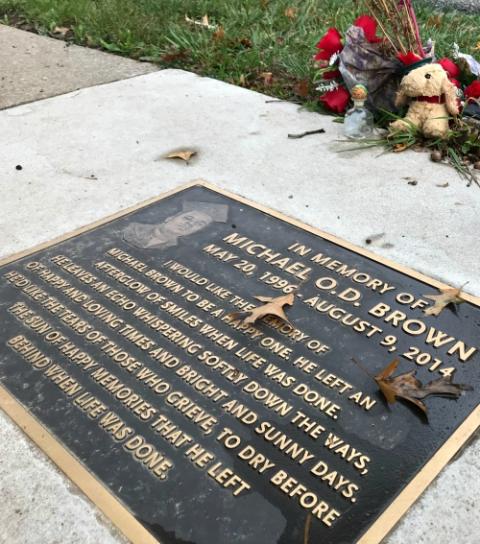
A memorial near the spot where Michael Brown was killed is seen in Ferguson, Missouri, in 2017. (GSR photo/Dawn Araujo-Hawkins)
Rozanski: In a sense, there's many similarities between the Archdiocese of Baltimore and the Archdiocese of St. Louis. And in both places, we had the unrest after Michael Brown, the unrest after Freddie Gray — Michael Brown in St. Louis, in Ferguson, Freddie Gray in Baltimore. So there is indeed a 400-year history of racism — that perhaps we don't want to acknowledge but we have to acknowledge — that is embedded in our system in the United States. There is very, very heightened awareness of violence that is done to African-Americans, and I think it really hits very hard when that violence is perpetrated by those who are called to protect us.
There has to be more dialogue, more understanding, more study of the way that police deal with different situations. And what happened to George Floyd in Minneapolis was totally, totally unacceptable, totally beyond the pale of whatever should be done to anyone who is being taken into police custody.
I think there needs to be dialogue. I think there needs to be greater understanding and a facilitation of that understanding. And I would be very, very interested in having the church at the center of that, in whatever way we can.
As I said yesterday in my remarks, Jesus did not shun any difficult circumstance or situation. He walked into that circumstance, and he named it. And he brought healing. So I think the church's ministry has to continue that healing, and it's so apparent in our country today.
How do you convey the importance of this dialogue and encounter to people?
I notice, certainly over my lifetime, that there has been an erosion even at the basic level of civil dialogue. There's a demonization of the other automatically. If a person holds a different opinion, if a person holds a different set of values, the reaction seems to be to demonize. And if that is the fabric of our society, then something is terribly, terribly wrong. We're missing the whole message of democracy.
In Springfield, you published a pastoral, "The Wideness of God's Mercy," which appeared even before Pope Francis published his exhortation Amoris Laetitia. What gave you the confidence to, in effect, take the ball from Francis and run with it in issuing this letter?
"The Wideness of God's Mercy" really came from gathering the input of parishioners of the Diocese of Springfield and reflecting on what their view of the church is, their experience of church is. So those ideas, those insights that were fed back to me were really the basis for that pastoral letter on the wideness of God's mercy. And it was a reflection on the mercy of God for each one of us.
But, also, it was a challenge to our clergy, our religious and our laity as to what we need to do to be a welcoming church, to let people know of the importance of God's mercy in our lives. So not only a reflection but an action. What do we do to respond? The church has to, in that line from Vatican II, read the signs of the times and be able to respond to those signs.
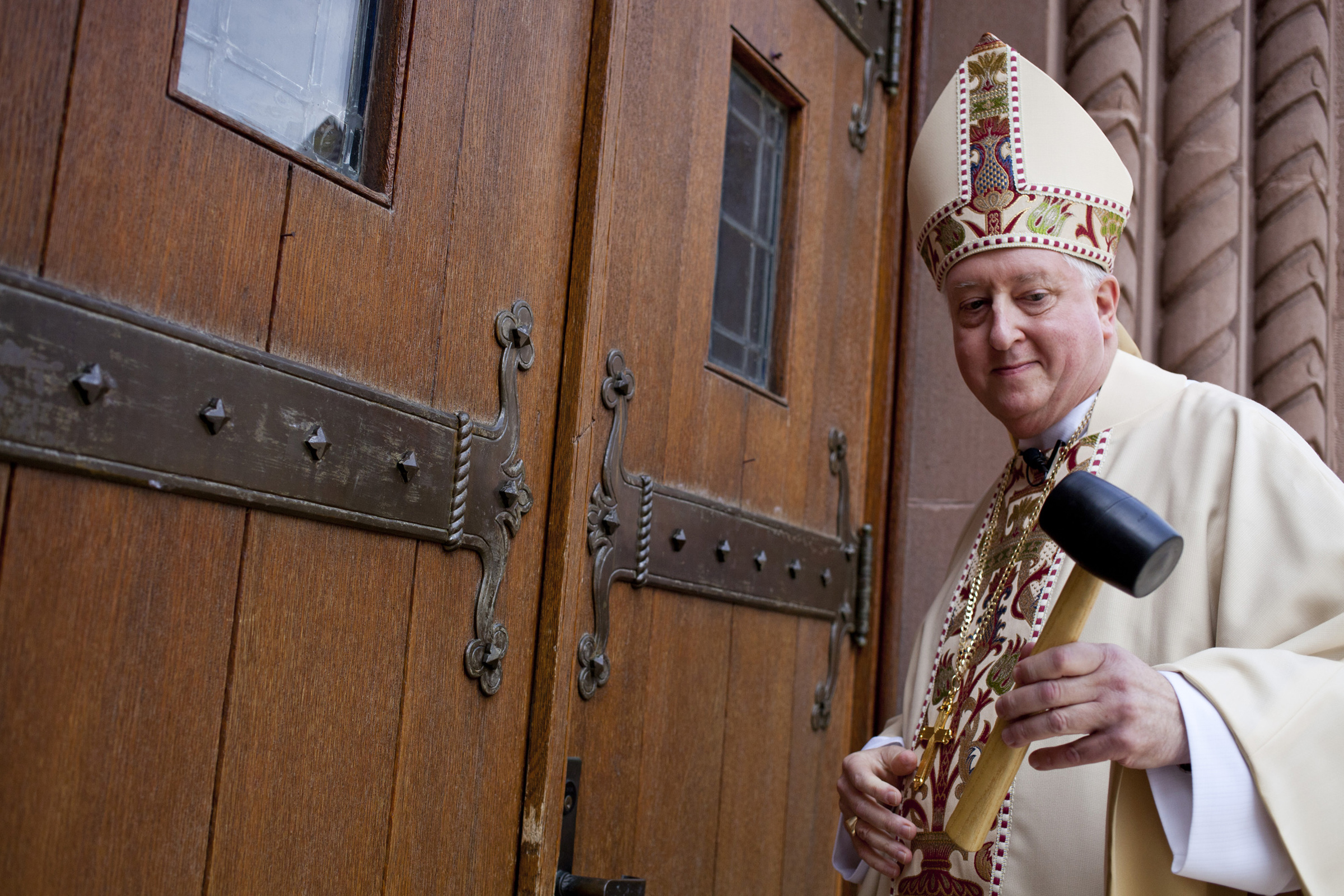
Bishop Mitchell Rozanski uses a mallet to knock three times on the doors of St. Michael's Cathedral in Springfield, Massachusetts, Aug. 12, 2014, before his installation as bishop of the diocese. (CNS/Catholic Review/Tom McCarthy Jr.)
Pope Francis, in declaring the Year of Mercy, I think had a wonderful insight that we have lost: that concept of what it means to be forgiven. And if we lose that concept humanly, how can we realize the divine forgiveness that's given to us? So look what it emphasized: reflection on mercy and what do we do about bringing mercy to our world in the 21st century.
Today's young people often draw connections such as mercy toward the planet, toward immigrants, toward the LGBT community. Where do you see these issues fitting into our outreach to younger people?
Young people are looking for depth and authenticity, and they're looking for what connects the divine with the human. And Pope Francis, I think, has done a masterful job of that. In his Laudato Si', he speaks about what we need to do in caring for our world and the ways in which we have abused our world. He speaks about its effect upon the poor.
It seems as though young people are willing to commit themselves to something that makes a difference for others in this life. Caring for the environment, reaching out to those who are in need, being able to feed those who are hungry — those sorts of things really attract young people to the church because they feel they have a sense of purpose in doing that and that they're making a difference.
And just as Jesus himself has made a difference for all of us, in his life and in his example, so too do I think young people need a very, very deep connection between what faith is all about and what their lives do in response to that faith, in terms of making that faith concrete in the world.
Pope Francis has also lifted up the value of interreligious dialogue in the world. Why is it important to have a pope who values dialogue?
I oftentimes say that Pope Francis is the pope who connects all the dots. I remember as a kid, and you probably remember this too, there were different puzzle books that had numbers, and you connected the dots. And when you connected the dots, you got a picture. That's how I feel Pope Francis preaches the Gospel. He connects the dots. He relates issues together with the Gospel. And then he points the way how to effectively deal with those issues.
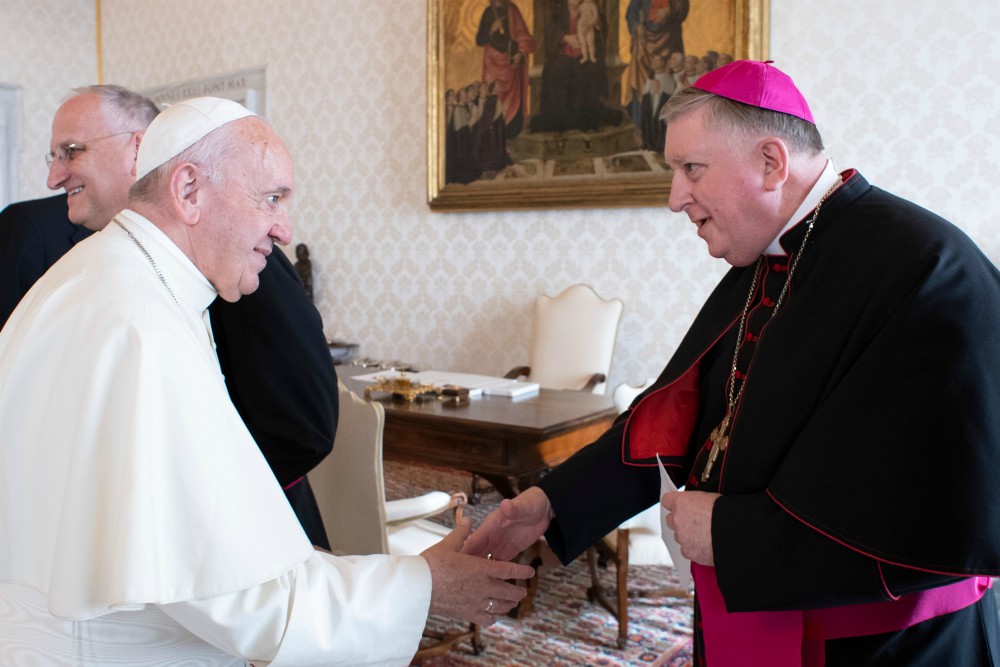
Pope Francis greets Bishop Mitchell Rozanski during a meeting with U.S. bishops from the New England states at the Vatican Nov. 7, 2019. (CNS/Vatican Media)
Pope Francis really does lead by example. We've seen it in so many ways. I remember when he was first elected, one of the first places he visited was Lampedusa. And that was where the immigrants were coming into Italy, but of course were being shipwrecked off the shores of Lampedusa. And his presence there just spoke volumes, as to remind us of who is our brother and who is our sister and for whom do we need to care.
That left upon me a very deep impression. So Pope Francis is able to connect those dots in a wonderful way of making the Gospel message clear, bringing that Gospel message into our homes and then helping us to connect our lives with the Gospel. Because that's really what the church is all about.
The U.S. is currently heading into what promises to be a tumultuous general election cycle. What's your approach as a faith leader to how the church fits into the public discourse?
In the midst of what we've become used to in election cycles, that harsh rhetoric, really the role of the church is to generate more light than heat — taking our Gospel values and applying them to how we go to the polls and vote. In the midst of a lot of heat, heated rhetoric, the church has to be the one who generates light.
So I find that that would be the role of the church. And to teach our people how to bring our beliefs — what we live and what we believe — to the voting booth. That's the role of the church. And certainly much needed in public forum.
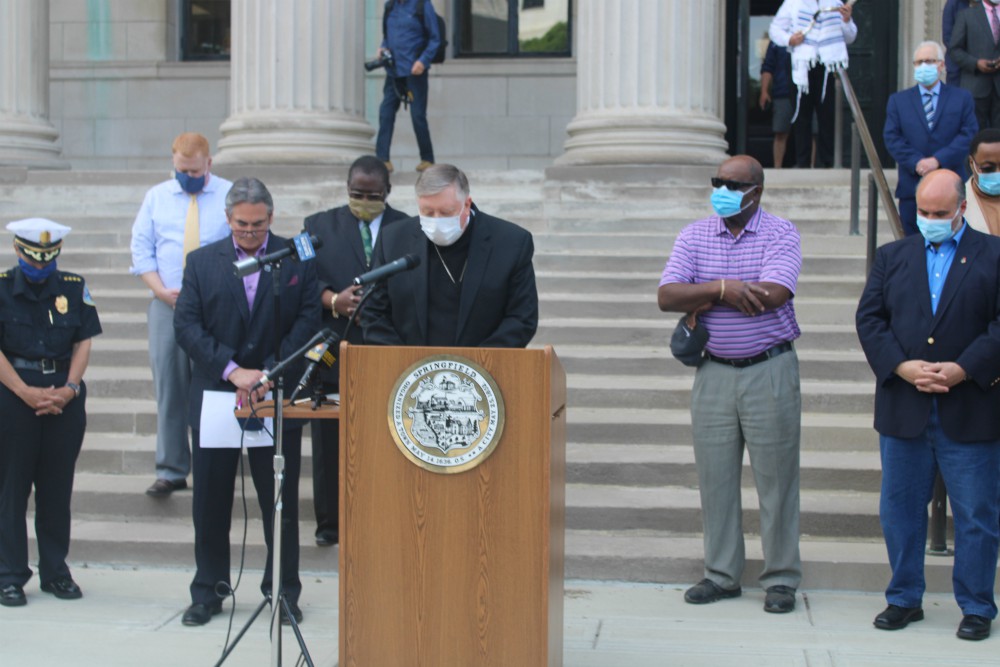
Bishop Mitchell Rozanski prays during an interfaith vigil for healing and hope held on the steps of City Hall in Springfield, Massachusetts, June 2. (Springfield-MA.gov)
I was very impressed here in the city of Springfield, after George Floyd's death and the unrest that went through the country, the mayor of Springfield called us together as faith leaders and had a prayer service on the steps of City Hall. And that does show where the church should be in the public forum.
This is a very difficult, devastating situation for our country. But to be there in leading in prayer and asking for peace and in asking for change and healing and making progress for everyone in the future, that's where the church needs to be.
When the ex-nuncio to the U.S., Archbishop Carlo Maria Viganò, first spoke out against Pope Francis in 2018, you pushed back pretty firmly. Since that time, he's increasingly drawn on apocalypticism, conspiracy theories and sowing discord against Francis and others in the hierarchy. How do you keep perspective as we witness a phenomenon like this?
First of all, I go back in history. And if we look at the history of the church, there were those who had their own opinions, those who thought they were living in the end times. If you read some of the writings from around the year 1000, many were expecting that that would be the end of time. But of course, here we are 1,020 years later, and we're still here. And we're still to get living the Gospel correct.
I think, deep down, we have to believe that in all of this mess, in all of this hype, in all of this demonization of the other, that the church has to continue to respond to the guidance of the Spirit. And responding to the guidance of the Spirit means following the Spirit's promptings, and to a world that is in such unrest and turmoil and demonizing of one another, we have to show the way of what it means to be respectful of each other and open to the promptings of the Holy Spirit.
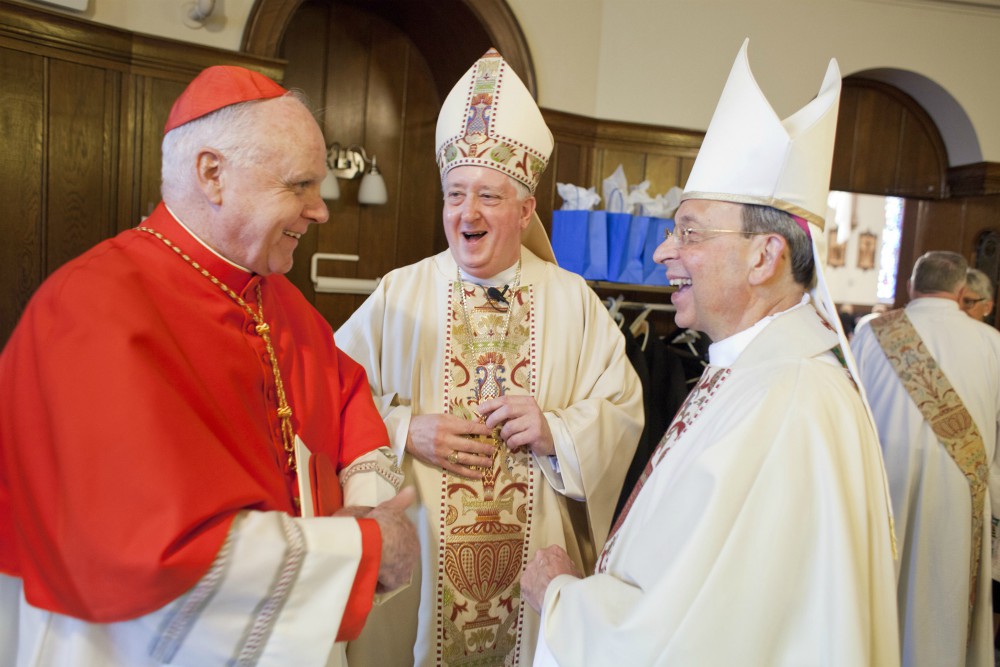
Cardinal Edwin O'Brien, left, grand master of the Knights of the Holy Sepulchre, and Baltimore Archbishop William Lori, right, share a light moment Aug. 12 with Bishop Mitchell Rozanski while vesting for his installation as bishop of the Diocese of Springfield, Massachusetts. (CNS/Catholic Review/Tom McCarthy Jr.)
And I think Pope Francis, in the midst of the criticisms that are hurled against him, he is a man who keeps the course. He's a man who follows the promptings of the Spirit. He doesn't allow all of that unrest on the periphery to get in the way of the Gospel message being proclaimed.
As a church, if we commit ourselves to that, no matter what the storms of the world are, that following the Gospel sets a greater example and has a greater impact than all of those different storms that go on around us.
Your ordination as a bishop followed shortly after the 2002 abuse crisis. What has that issue taught you? How has it shaped your ministry as a bishop?
The issue of clergy sexual abuse is such a painful issue, painful for the victims, painful for the rest of the church in the scandal that has been brought about by it, but the church certainly needed to respond effectively and immediately and with ways that will prevent this from happening in the future.
I find at this point there is among, not only clergy and men and women religious, but also in the laity, through the trainings that we have had, a heightened awareness of what signs to look for. When something seems amiss — as we say so much today, when you see something, say something.
So in equipping members of our church to be able to recognize the signs of sexual abuse and not be reticent in coming forward to say something, I think that that is so, so important. When the Dallas Charter was put together in 2002, there was a resolve that not only did those perpetrators of child sexual abuse need to be dealt with, but also, if we're to be on vigil against this, then we have to have people who recognize the signs and are able to have the confidence to step forward and say something. I've witnessed that in my time as bishop, and I think that that's been very, very important.
Advertisement
What gives you hope?
What has increased my faith over the years and really has given me great hope is the witness I see from many of our laypeople and their commitment to living out the Gospel. And that truly, truly gives me hope.
In the Diocese of Springfield — up in the town of Greenfield, north of Springfield — a permanent deacon organized a group of people at the beginning of this COVID-19 crisis, saw that there would be many people out of work, saw that there would be many people in need. He organized a grocery distribution that takes place every Saturday morning. And the people there committed themselves to collecting groceries and bagging them and distributing them in a very safe way, in light of the COVID virus, until this crisis is over.
So that's really taking the Gospel, looking at a situation that is going on in our country today and responding to it in a way that makes a difference in others' lives. Just to watch that and witness that — and so many other incidences like that in which people reach out, even in the midst of crisis — just gives me great hope and shows the depth of faith that is here amongst our people. I thank God for that. I really do.
[Don Clemmer is a writer, communications professional and former staffer of the U.S. Conference of Catholic Bishops. He writes from Indiana and edits Cross Roads magazine for the Catholic Diocese of Lexington, Kentucky. Follow him on Twitter: @clemmer_don.]







